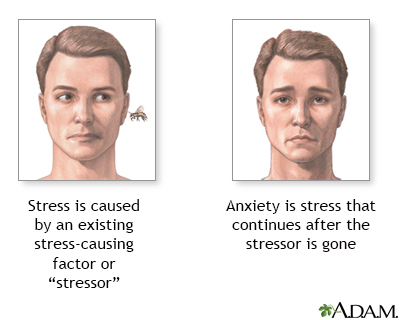Panic Disorder

What is panic disorder?
Panic disorder is a type of anxiety disorder characterized by sudden and recurrent panic attacks. These attacks can occur unexpectedly and without an obvious trigger, causing intense fear and physical symptoms such as chest pain, shortness of breath, and palpitations.
Who's at risk for panic disorder?
Panic disorder can occur in individuals of any age, but it is more common in those in their late teens to mid-30s. Other risk factors include:
- Family history of panic disorder or other anxiety disorders
- Trauma or stress
- Substance abuse
- Major life changes, such as a divorce or the death of a loved one
What causes panic disorder?
The exact cause of panic disorder is not fully understood, but it is thought to be a combination of genetic, environmental, and psychological factors. Imbalances in brain chemicals and changes in brain function may also play a role.
How does panic disorder start?
Panic disorder typically starts with the onset of panic attacks. These attacks can occur suddenly and without warning, often causing individuals to fear future attacks and develop a sense of apprehension or dread.
What are the symptoms of panic disorder?
Symptoms of panic disorder can vary but often include:
- Sudden and intense feelings of fear or anxiety
- Chest pain or discomfort
- Shortness of breath or hyperventilation
- Rapid heartbeat or palpitations
- Sweating or chills
- Nausea or stomach upset
- Dizziness or lightheadedness
- Fear of losing control or going crazy
How is panic disorder diagnosed?
Panic disorder may be diagnosed through a thorough evaluation of symptoms and medical history. Other tests, such as blood tests or imaging, may be used to rule out other medical conditions that can cause similar symptoms.
How can panic disorder be treated?
Treatment for panic disorder may include a combination of medication and therapy, such as:
- Antidepressants or anti-anxiety medications to reduce symptoms
- Cognitive-behavioral therapy (CBT) to help individuals understand and manage panic symptoms
- Exposure therapy to gradually expose individuals to feared situations or objects
What complications may occur with panic disorder?
Panic disorder can significantly affect an individual's quality of life, leading to social isolation, difficulty with work or school, and other mental health conditions such as depression or substance abuse.
How can I prevent panic disorder?
While there is no sure way to prevent panic disorder, individuals can take steps to reduce their risk, including:
- Seeking treatment for mental health conditions
- Learning stress-management techniques, such as mindfulness or relaxation
- Avoiding drugs or alcohol that can trigger or worsen symptoms
Long-term management of panic disorder
Long-term management of panic disorder may involve ongoing treatment and monitoring to prevent the recurrence of symptoms. Individuals may also benefit from support groups or counseling to address any ongoing issues or concerns.
What is recent research saying about panic disorder?
Recent research in panic disorder is focused on improving the understanding and treatment of this condition. Other areas of research include:
- Identifying genetic risk factors for panic disorder
- Developing new treatments, such as transcranial magnetic stimulation (TMS) or ketamine infusions
- Improving the accuracy and reliability of diagnostic criteria for panic disorder
Where can I go for more information on panic disorder?
For more information on panic disorder, individuals can speak with their healthcare provider or visit reputable websites, such as:

